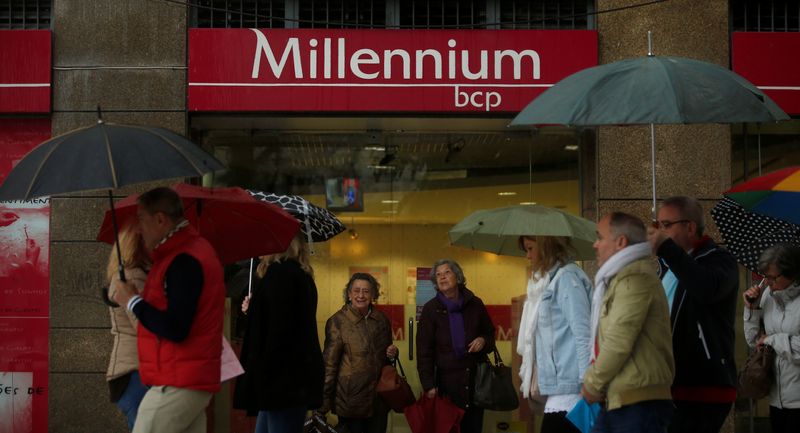By Sergio Goncalves
LISBON (Reuters) - Portugal's largest listed bank, Millennium bcp, reported on Wednesday a five-fold rise in first-half net profit, boosted by solid core income and strict cost cutting, despite high provisions at its Polish subsidiary.
The bank booked a consolidated net profit of 74.5 million euros between January and June, up from 12.3 million euros a year earlier, with profit in its domestic business increasing 63% to 174.5 million euros.
Its Polish subsidiary, Bank Millennium, said on Tuesday that it halved its losses to 56.6 million euros in the first half of 2022, despite the 257.8 million euros provisions and costs related to legal risks over its portfolio of foreign currency mortgage loans.
Chief executive Miguel Maya said that "the improvement in results was mainly due to the increase in the group's core income, which grew by 22.7% to 1.37 billion euros, and a rigorous management of operating costs", which fell by 12.5% to 516.2 million euros.
Its cost-to-income ratio dropped to 40% in June, compared to 53% a year earlier, showing it is "increasingly efficient", he said.
Millennium bcp said its consolidated net interest income, a measure of earnings on loans minus deposit costs, rose 28.6% to 985.2 million euros in the first half of this year, while fees and commissions grew 34.6% to 387.9 million euros.
"I am confident, but there is no reason for euphoria... The global economic environment is challenging and Portugal is not apart from what is happening in the world," Maya told reporters.
He sees the war in Ukraine, rising energy costs and disruptions in supply chains causing "a slowdown of the Portuguese economy, but not a serious structural problem".
European Central Bank efforts to arrest runaway inflation across Europe with higher borrowing costs have boosted the bottom lines of several top lenders but a big question on bankers' minds now is whether even deeper cuts in gas supplies will affect economies in the region and banks.
Continuing the clearing of its balance sheet, the bank said it reduced total non-performing exposure by 16.7% to 2.5 billion euros in June from a year earlier.

"I do not forecast an increase in non-performing exposures over the next two years caused by rising interest rates," he said.
Its common equity Tier 1 ratio stood at 11.3% in June 2022, down 30 basis points from a year earlier, but Maya said this level "is adequate and above regulatory requirements".